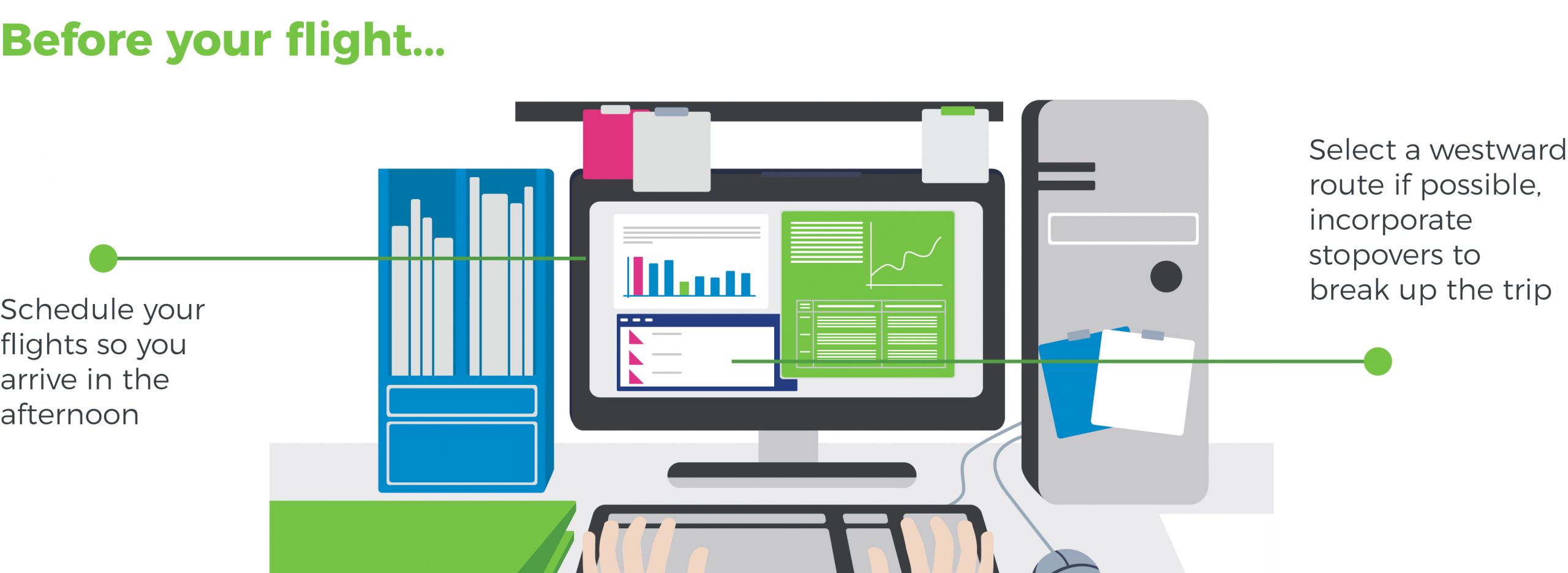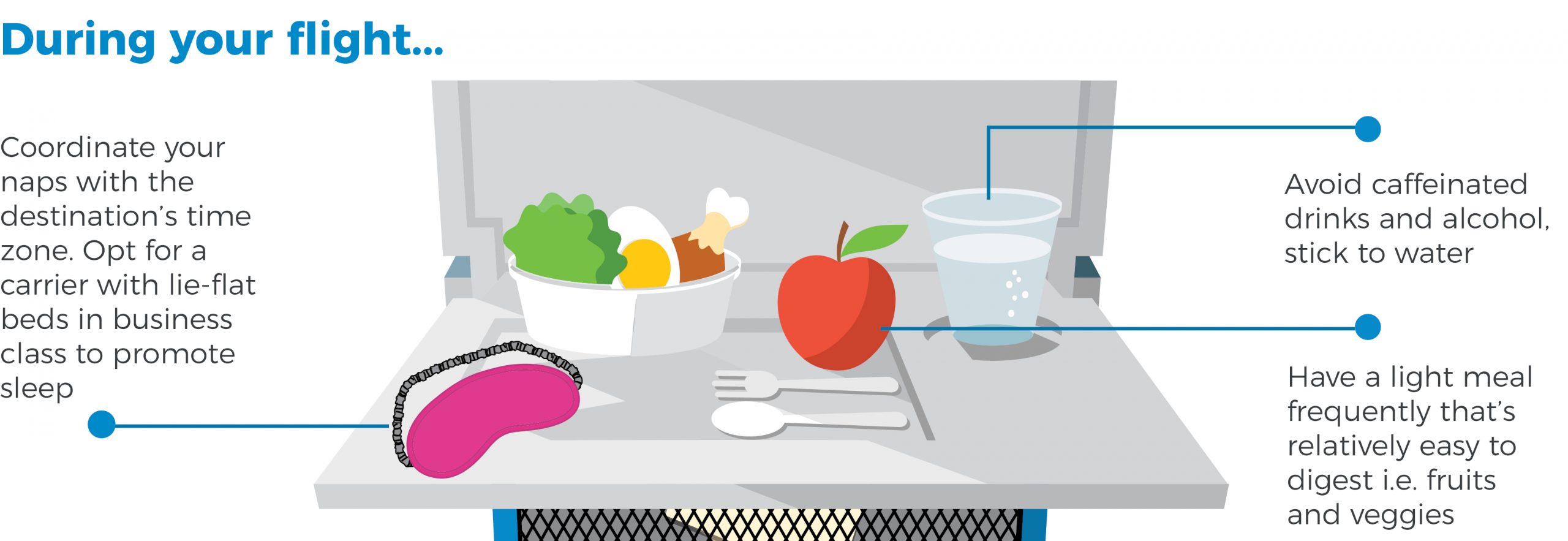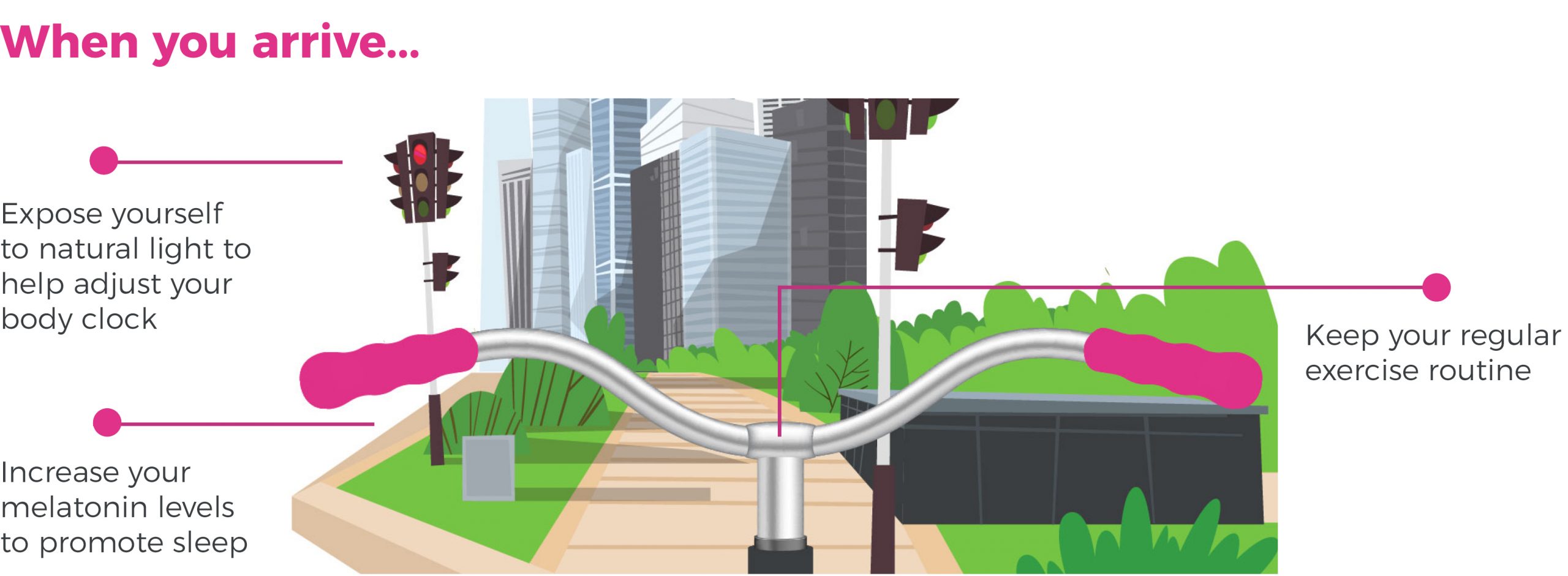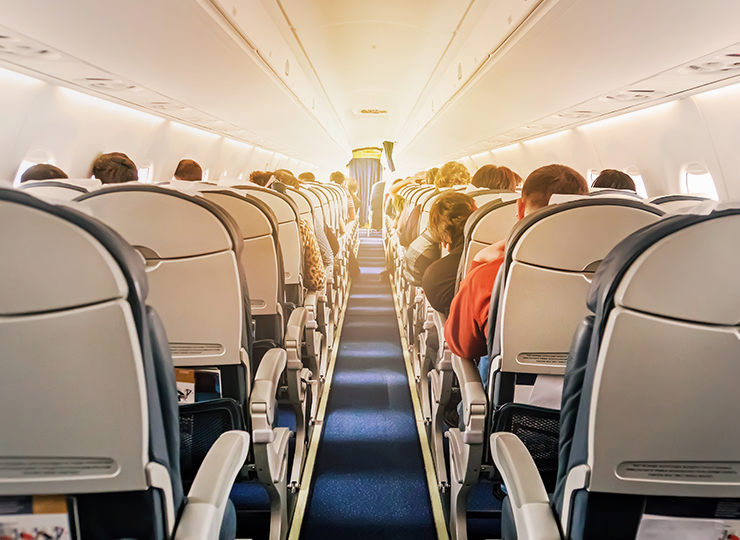

A guide to reducing business travel jet lag
For some business travellers, it may have been a while since their last international flight and the perfect time to revisit what you can do to reduce business travel jet lag. Time Zone Change Syndrome, or ‘jet lag’ as it is more commonly known, is an issue many business travellers face on a regular basis. When left unmanaged, it can be a major hindrance to productivity and wellbeing.
When it comes to international travel for business, it’s important to give yourself every advantage possible to ensure you are performing at maximum capacity. Whether you’re a travel booker or a business traveller, there has never been a better time to follow and share these tips and tricks for international business travellers to prepare for and manage jet lag.
Scientifically speaking, jet lag is caused by a disturbance to ‘circadian rhythms’, which operate on 24-hour cycles and involves physical, mental and behavioural changes in our bodies. Travelling through different time zones requires an adjustment of these rhythms, and can result in fatigue, indigestion and concentration loss.
While scientists are still yet to find a cure for jet lag, travel experts and health professionals have discovered tactics that can be implemented at each stage of your journey to minimise the impact of jet lag.
Tips to reduce business travel jet lag before your flight

Choose flights that arrive in the afternoon
Afternoon or early evening arrivals are best for reducing the effects of jet lag, as normal sleeping patterns can be achieved quickly and naps are easier to avoid. If an afternoon arrival isn’t an option, keep daytime naps to 45 minutes or less. This ensures that adjustment to the new timezone is quicker and you’ll be more alert and productive when you need to be over the course of the business trip.
West is best, east is a beast
Travelling eastward incurs a much greater disturbance to our biological clock than travelling westward, because we are giving our circadian rhythms less time in the day to adjust to the new time zone. If possible, try to select a westerly route as the extra hours in the day will give your body the time it needs to adjust. If flying eastward is inevitable, allow approximately one and a half days of recovery time per time zone crossed. Keep this in mind when scheduling any important meetings or events!
Add stop-overs
Although sometimes impossible for business travel with tight schedules, adding a stopover of at least 24-hours on long-haul flights can be beneficial in resetting your body and reducing jet lag. Be strategic and schedule a stop-over in a city where you have clients or business partners to visit. You might as well kill two birds with one stone, all while reducing jet lag.
During your business travel flight

Coordinate sleeping times
Use sleeping masks and noise-cancelling headphones or earplugs to ensure you can coordinate your sleeping time with that of your destination, even if it’s still light outside. Consider meditating every two hours for 30 to 60 minutes until your sleep pattern is in sync with your destination time-zone.
Choose a carrier with lie-flat beds
Fully lie-flat beds are a business and first-class luxury that are becoming standard in some airlines today. This is because horizontal sleeping plays a major role in facilitating deep sleep and minimising jet lag for road warriors. If the front-end of the aircraft is not a feasible option, opt for the premium economy alternative where possible. Premium economy will usually provide you with greater seat recline, wider seats and extra legroom to assist with sleep without blowing your budget.
Limit screen time
Where possible, avoid the use of your phone or laptop unless necessary. It has been well established that the prevalence of blue light from such devices can interrupt your circadian rhythm and melatonin secretion, leading to a lack of quality sleep. Activating the “Night Mode” feature found on most mobile devices can also assist you in maintaining a proper body clock by dimming and warming the light when the local environment is dark.
Avoid caffeine and alcohol
Pressurised cabin air is already very dehydrating, so it’s best to try to avoid caffeinated and alcoholic drinks in-flight. High altitudes also quicken the effects of alcohol (one in the air is equivalent to two on the ground), and the last thing you need to add to your jet lag is a hangover. It is recommended you keep a bottle of water with you and sip periodically throughout the flight. This will encourage you to stand up and stretch your legs when it’s time for a refill.
Light meals only
Some travellers prefer to fast on their journey to reduce the effects of jet lag. If that’s not an option for you, opt for fruit and vegetables or light, warm meals that are easily digested. The aim of this is to minimise the potential for discomfort and fatigue so you arrive refreshed and ready to hit the ground running.
When you arrive at your destination

Expose yourself to light
The sooner you are able to expose your body to natural light, the sooner your biological clock is able to adjust to the new time zone. This is because our circadian rhythms are controlled by light and darkness.
Increase your melatonin levels
Melatonin is a naturally secreted hormone that controls your body clock by promoting sleep. Eating foods that are high in tryptophan, such as dairy, red meat, fish and peanuts, can help to stimulate melatonin. Seek professional medical advice before taking any health supplements.
Keep your regular exercise routine
Exercise helps to increase your body temperature which plays a role in resetting your circadian rhythm. Try exercising outside to take in the natural sunlight and quicken the process.




